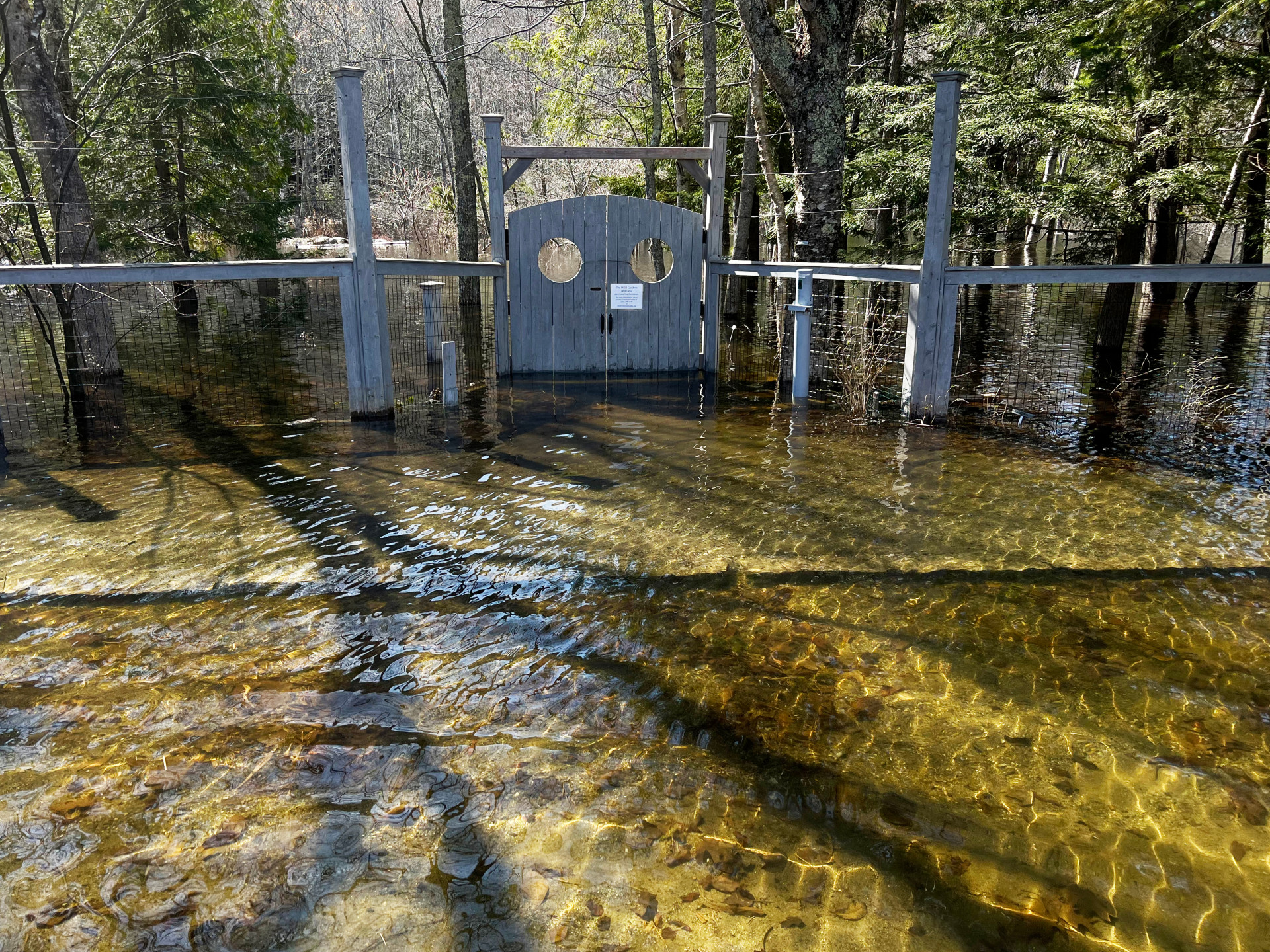Wild Gardens are Open!
Update May 26, 2023: The Wild Gardens of Acadia have opened for the season.
May 11th, 2023
Update May 26, 2023: The Wild Gardens of Acadia have opened for the season.
May 11th, 2023

Flooding at the Wild Gardens of Acadia.
The Wild Gardens are now open. (Learn more about visiting the Wild Gardens of Acadia.)
The gate by the Nature Center will remain locked for the time being until we are able to get it repaired. The National Park Service will also be working on the bridge by that entrance soon. For now, visitors will be able to enter through the gate by the parking lot and exit by the work area.
Wild Gardens was Closed as Damage was Assessed and Repaired
May 10, 2023: The Wild Gardens of Acadia remain closed due to extensive flooding at the Great Meadow Wetland and Sieur de Monts this past winter and spring. Wild Gardens volunteers are working with park staff to assess the repairs needed to infrastructure, as well as to evaluate damage to the plants, shrubs, and trees. We’ll provide updates on social media as we have them
For several months this past winter and spring, the Great Meadow Wetland and Sieur de Monts area of Acadia National Park were flooded due to a partially collapsed culvert under the Park Loop Road.
Rain and snowmelt flows throughout the year into the Sieur de Monts/Great Meadow area from Dorr Mountain, The Tarn, Kebo Mountain, and Huguenot Head. Since the water was unable to drain out of Great Meadow via Cromwell Brook, it flooded the Wild Gardens of Acadia, Sieur de Monts Nature Center, Jesup Path, and Hemlock Road.
Because the water was frozen throughout the winter, work to fix the culvert could not begin until the water thawed in the spring. When the water melted, park staff began work to unplug the culvert.
In late April, a local contractor successfully unplugged the culvert, allowing water to flow downstream again. The one-way section of the Park Loop Road between the intersection with Kebo Street and Sieur de Monts remains closed to all traffic, including pedestrians and bicycles. National Park Service (NPS) staff are working to issue an emergency contract to replace the blocked culvert, which will keep water flowing out of the Great Meadow wetland in the short term.
The flooding at Sieur de Monts and Great Meadow is not an isolated incident. The Great Meadow has been significantly altered by humans and doesn’t drain the way a meadow should. This issue is heightened because of climate change and a high number of invasive plants in the area. Because of this, the NPS, Friends of Acadia, and Schoodic Institute have been partnering for several years on a long-term plan to restore the Great Meadow Wetland. The NPS has hopes to replace the undersized culvert in 2024 with an open bottom box culvert designed to accommodate larger rainfalls and to improve the ability of aquatic species to pass between Great Meadow and downstream areas.
Federal funding through the Bipartisan Infrastructure Law will enhance this initiative, improve recreational experiences, and restore the health of the Great Meadow Wetland. The National Park Service is accepting public comment on the Environmental Assessment associated with the restoration plan until May 23, 2023.
Meanwhile, Friends of Acadia and park staff continue to assess the effects of the flood on the Wild Gardens of Acadia and other affected infrastructure. Trail repairs are needed on the Jesup Path boardwalk and electrical systems at the Nature Center and restrooms need to be assessed.
The Wild Gardens have sustained damage to the deer fence that surrounds the gardens, and repairs are needed for both the irrigation system and the log edgings that line the walkways. The integrity of other structures, such as bridges and bulletin boards, will be evaluated to ensure they are sound.
Although many of the plants in the Wild Gardens are adaptable, four months underwater is a long time! Additionally, the movement of winter ice atop the flood waters broke off many small shrubs and trees. Other plants, adapted to well-drained soil, have been heavily impacted. The result of continuous inundation by water is not always visible right away. Pests, diseases, and damage to roots from the flood stress may appear over the coming months. These impacts may also be seen outside the Gardens in the surrounding forested areas that were similarly flooded.
The NPS and partners are working hard to restore all areas and structures affected by the floods. We hope to have the Nature Center and the Wild Gardens of Acadia open as soon as possible so that park visitors can learn about the effects of climate change on Acadia and enjoy the native plants of Acadia.
Thanks to all of the volunteers who are working so diligently to assist the park in getting the Gardens reopened.